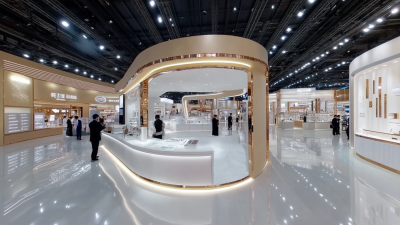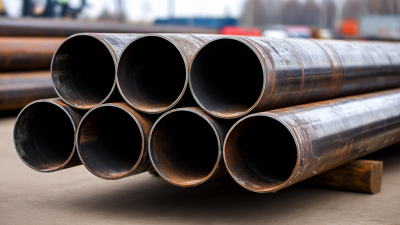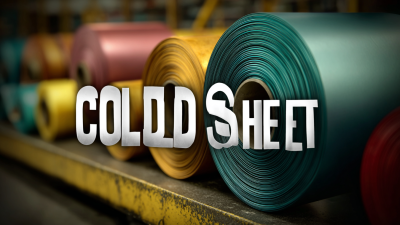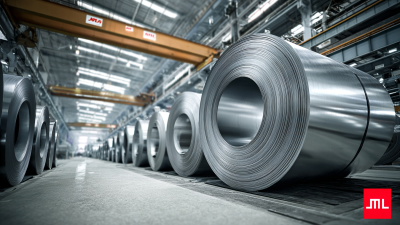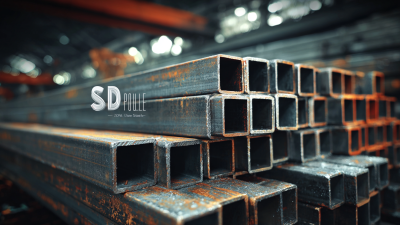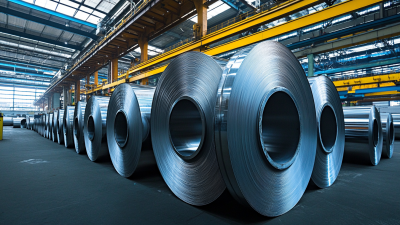In the rapidly evolving landscape of industrial applications, the use of Copper Strip has emerged as a crucial element, offering numerous advantages that enhance efficiency and productivity. A recent report by the International Copper Association highlights that copper is highly valued for its superior electrical conductivity, which is approximately 60% higher than that of aluminum, making it indispensable in electrical engineering. Furthermore, the World Copper Factbook 2023 indicates that the global demand for copper is projected to rise significantly, driven by advancements in renewable energy technologies and electric vehicle production. This surge in demand presents an opportunity for industries to leverage Copper Strip for its excellent ductility and resistance to corrosion, ultimately leading to enhanced performance and longevity of industrial products. By integrating Copper Strip into their operations, manufacturers can optimize their processes while adhering to sustainable practices, making it a pivotal choice for future-oriented industries.

Copper strips are increasingly recognized for their superior electrical conductivity, making them an essential component in various industrial applications. One of the primary benefits of using copper strips is their ability to efficiently transfer electricity, which is crucial in manufacturing processes that rely on high-performance electrical systems. With a conductivity rating that is significantly higher than most metals, copper strips minimize energy loss, ensuring that equipment operates at peak efficiency. This characteristic not only boosts productivity but also contributes to overall cost savings for manufacturers.
Moreover, the versatility of copper strips allows them to be easily integrated into different systems, from wiring in electrical panels to components in renewable energy setups. Their excellent malleability means they can be shaped to fit specific requirements without compromising their structural integrity. This adaptability makes copper strips an ideal choice for industries ranging from automotive to electronics, where reliable and efficient electrical connections are paramount. In summary, the benefits of enhanced electrical conductivity offered by copper strips position them as a key material that drives innovation and efficiency in manufacturing.
Copper strips have gained prominence in various industrial applications primarily due to their exceptional corrosion resistance, especially in harsh environments. According to the U.S. Geological Survey (USGS), copper is recognized for its natural resistance to corrosion, allowing it to maintain structural integrity even when exposed to moisture, pollutants, and other aggressive elements. This attribute is particularly beneficial in industries such as telecommunications and power generation, where equipment is often subjected to challenging environmental conditions.
In a study published by the National Association of Corrosion Engineers (NACE), it was found that the use of copper in electrical connectors significantly reduces the risk of failure due to corrosion, leading to decreased maintenance costs and downtime. The report highlights that copper's ability to form a protective patina not only prolongs the life of the materials but also enhances performance reliability. This reliability is crucial for infrastructure projects where safety and efficiency are paramount, making copper strips an ideal choice for manufacturers seeking durable solutions in demanding settings.

The utilization of copper strips in industrial applications presents significant cost advantages that can lead to long-term economic benefits.
According to the International Copper Association, the conductivity and durability of copper make it an ideal material for electrical applications, which can enhance efficiency and reduce maintenance costs over time.
With a reported lifespan of over 50 years, copper strips can decrease the frequency of replacements, which translates to substantial savings for businesses.
Moreover, a study by the Freedonia Group underscores that industries using copper strips have been able to lower their operational costs by as much as 20%.
This is attributed to copper's lower energy consumption during manufacturing processes and its recyclability, which can cut down on raw material expenses.
As companies increasingly seek sustainable practices, the long-term economic impact of investing in copper strips becomes even more apparent.
The initial investment may be higher compared to other materials, but the cumulative savings on energy, maintenance, and replacement costs can lead to a favorable return on investment, positioning companies for future growth.
Copper strips have emerged as an essential component in thermal management systems across various industrial applications. The superior thermal conductivity of copper, rated at approximately 400 W/m·K, significantly enhances heat dissipation processes compared to other materials like aluminum, which has a thermal conductivity of around 235 W/m·K. This property is particularly vital in high-performance environments, including power electronics and manufacturing equipment, where overheating can lead to equipment failure and increased operational costs.
Recent industry reports indicate that utilizing copper strips can lead to a reduction in thermal resistance by up to 50% in certain applications. This reduction not only enhances the reliability of systems but also improves overall energy efficiency, which is crucial in an era where energy consumption and sustainability are increasingly prioritized. For instance, in data centers, where maintaining optimal temperatures can determine the success of operations, the implementation of copper-based thermal management solutions has been linked to a reduction in cooling energy requirements by approximately 20%. As industries seek to optimize their thermal management strategies, copper strips represent a favorable choice that combines performance with sustainability.
| Property | Description | Advantages in Thermal Management |
|---|---|---|
| Thermal Conductivity | Copper has a high ability to conduct heat. | Faster heat dissipation, reducing the risk of overheating. |
| Corrosion Resistance | Copper resists corrosion and maintains integrity over time. | Increases longevity of industrial components, ensuring reliable operation. |
| Malleability | Copper can be easily formed into complex shapes. | Facilitates innovative designs for efficient thermal management systems. |
| Electrical Conductivity | Copper is one of the best electrical conductors. | Enables seamless integration of thermal and electrical systems, enhancing efficiency. |
| Cost-effectiveness | Copper provides a balance between performance and cost. | Offers an economically viable solution for large-scale industrial applications. |
Copper strips have gained popularity in various industrial applications, largely due to their eco-friendly benefits. One of the most significant advantages of copper is its recyclability. Unlike many metals, copper can be recycled multiple times without losing its quality or properties. This characteristic not only conserves natural resources but also reduces the energy needed for production. By integrating recycled copper strips into manufacturing processes, industries can significantly lower their carbon footprint while promoting sustainability.
Moreover, the use of copper strips contributes to efficient waste management in industrial settings. With their high conductivity and reliability, copper strips can replace less sustainable materials, ultimately leading to a decrease in waste generation. The growing emphasis on sustainable practices has sparked interest from corporations aiming to meet environmental standards, making copper a viable option for businesses looking to enhance their sustainability initiatives. As industries continue to prioritize eco-friendliness, the demand for copper strips will likely rise, showcasing their role as a cornerstone for a greener future.

